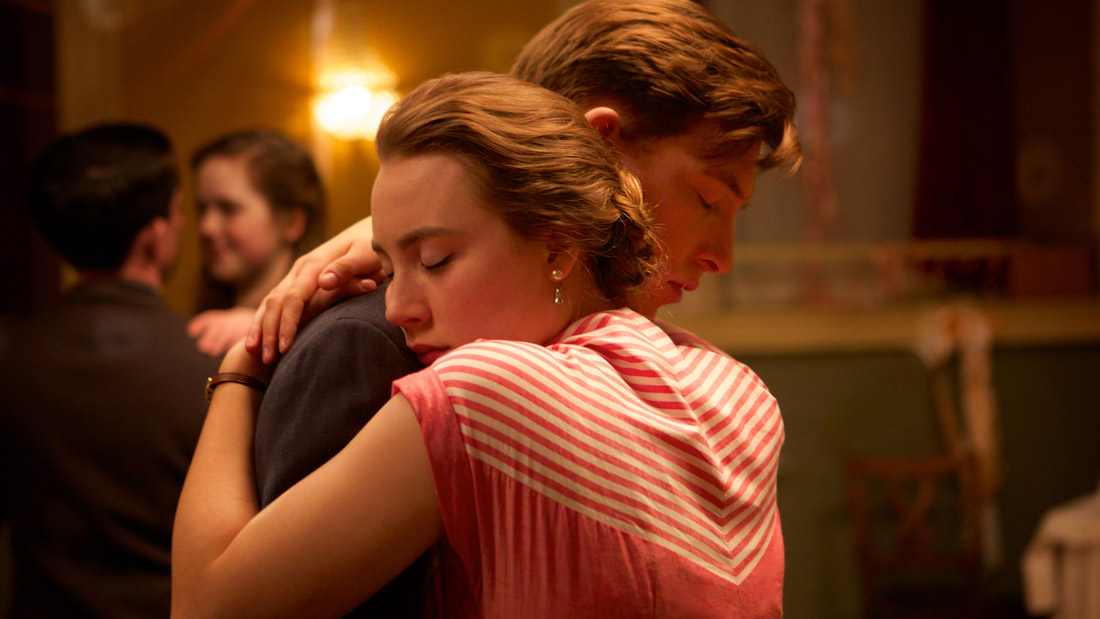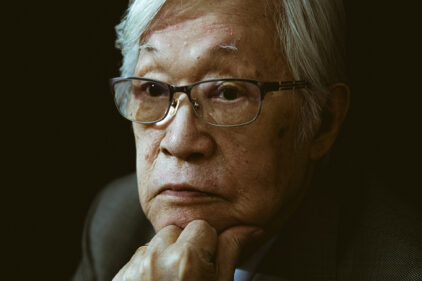With its melodramatic score and sumptuously photographed
imagery of a snow-covered ‘50s New York City, I fought against John Crowley’s “Brooklyn”
for about twenty minutes. Words like sentimental and maudlin crossed my mind and made it to my notebook. I’m not sure where it turned me. It could have been a look in Saoirse Ronan‘s eyes or a musical cue or just the right image, but I was helpless. It worked its magic. And, yes, this movie is magical.
Could it be that
a story about an Irish young woman moving to Brooklyn and falling in love with
an Italian plumber struck a personal chord given my Irish-Italian background?
Certainly. Could it be that I’m just a big softie who smiled when they went to
see “Singin’ in the Rain” and teared up on cue several times? Yes it could.
Some will discount Crowley’s film as a saccharine variation on James Gray’s “The
Immigrant” but that would sell this film short. Its real comparative cinematic
brethren is the great “In America,” another film that wore its heart on its
sleeve and dared the most cynical to remain cold-hearted. Like Jim Sheridan’s movie, this is a beautiful
film from top to bottom, a piece that worked the kind of old-fashioned,
romantic movie magic on me in ways that are all too rare.
Based on Colm Toibin’s hit novel, which has been deftly
adapted here by Nick Hornby, “Brooklyn” opens in a small Irish town, where we
meet the reserved but genuinely sweet Eilis Lacey (Saoirse Ronan). She wants to
move to America, but it breaks her heart that she’ll be leaving her mother and
sister to do so. For poor Irish immigrants in the ‘50s, moving to the States
often meant that you might not see your family ever again, if the cost of the
lengthy boat trip proved something unaffordable. “Brooklyn” reminds one how
much people often left behind to move to this country, and will tear apart
anyone feeling homesick themselves or with even the slightest regret that they’re
not still taking care of family or supporting siblings.
For months, Eilis has difficulty adjusting to the new world.
She’s constantly distracted by her homesickness, and doesn’t really fit in with
the other girls at the boarding house (run by a scene-stealing Julie Walters).
She gets a job at a department store (managed by Jessica Pare of “Mad Men”) and
seeks counsel from a connection to her old life played by Jim Broadbent. She
writes letters home, but it’s not the same. Still, like so many immigrants, she
trudges forward, and her life changes forever when she meets a
so-sweet-your-teeth-will-hurt Italian young man (Emory Cohen of “The Place
Beyond the Pines”) who falls for her hard. Just as Eilis is about to start a
new life in Brooklyn, her old one calls to her for reasons I won’t spoil and a
breathtakingly tough decision awaits.
Filmed with lyrical beauty by the great Yves Bélanger (“Wild,”
“Gerry”), “Brooklyn” often plays like a dream, with its soft colors and lyrical
framing. Bélanger and Crowley beautifully contrast the relatively cramped
spaces of NYC with the open fields of Ireland; so much so that seeing one of
the latter on Long Island has thematic importance—it looks a bit like home.
Michael Brook’s (“Into the Wild,” “Heat”) old-fashioned score swoops and spins
like the romantic movies of the era. And Hornby’s script dares you to go with it
in terms of its brazen romance. This is a film where people look lovingly at
each other and we believe the emotion of the moment despite knowing our
heartstrings are being pulled.
Part of the reason it works is Ronan’s remarkable commitment
in every scene (and her great chemistry with Cohen). This may be her best work
to date (although I love her in “Atonement” and “Hanna” too). The arc of Eilis
is one from youth to adulthood, and Ronan conveys it in remarkably subtle ways.
At first, Eilis is shy, scared, and uncertain. As she gets better at her job,
makes friends, and finds love, her entire body language changes. She becomes
confident enough to make decisions of her own. At its core, that’s what “Brooklyn”
is about—a woman who stops letting other people decide for her and finds the courage to seek her own happiness. With the right studio, it could easily
be one of the most crowd-pleasing hits of this year’s Sundance.
In an increasingly cynical age of cinema—especially at a
Sundance where it feels like every film is about people dying—it’s remarkable
to see that romance can still connect with an audience. On the shuttle after
the standing O at the screening, I’ve never heard so many people proclaim a
movie their favorite of the fest. There will be a number of people who can’t
get past the melodrama or the romance, but there was a whole busload of fans tonight. And I was on it.












